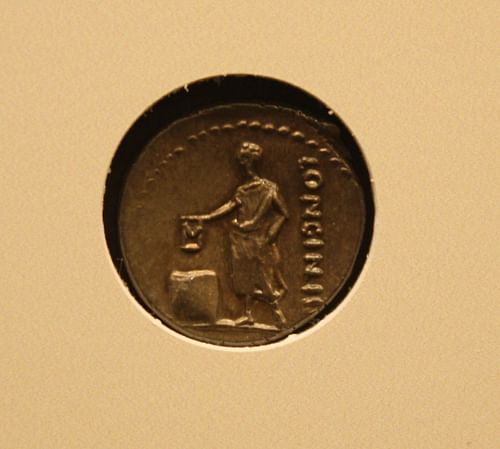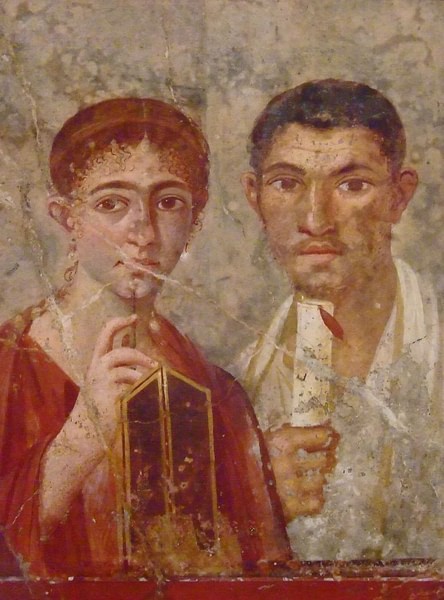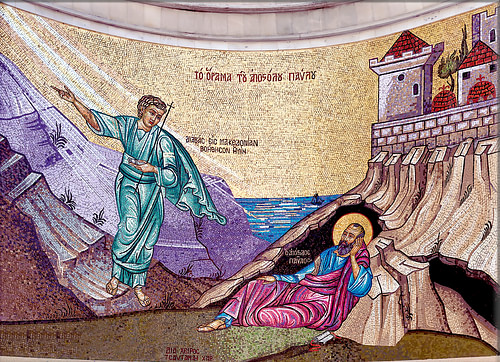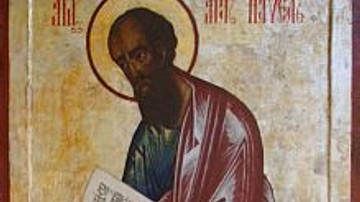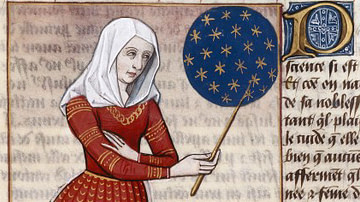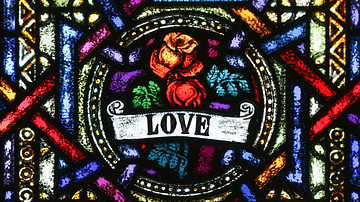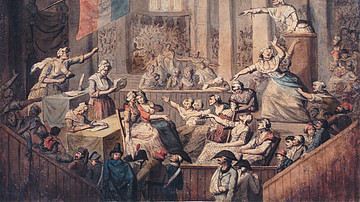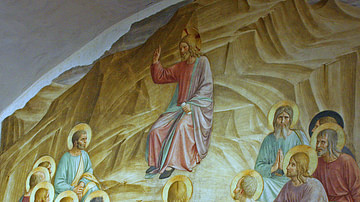Christianity began as a sect of Judaism in Judea in the 1st century CE and spread to the cities of the Eastern Roman Empire and beyond. In these cities, non-Jews, Gentiles, wanted to join the movement, and these Gentile-Christians soon outnumbered the Jews. The evolution of Christian beliefs and concepts (what would become dogma) absorbed both Jewish ideas as well as those of the dominant culture, but Christianity created innovations that transformed traditional thinking in relation to society and gender roles.
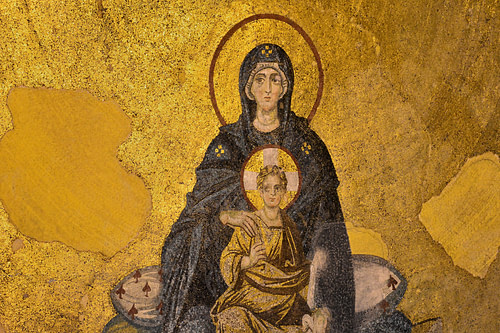
The most important changes in society and gender roles could be summarized as follows:
- Christianity eliminated the idea of ethnic cults by creating a portable religion.
- Marriage became a sacred bond for life.
- The tradition of patron saints developed.
- Sexual intercourse became a sin.
- Women were demonized.
Ancient Societies of the Mediterranean Basin
In the ancient world, there was no separate category known as 'religion'. Religion was absorbed under the rubric of one's ancestral customs. These customs were handed down from the gods through the ancestors. Everything in life was understood as a relationship with the gods (the universal powers of the heavens and under the earth). A person was born into their ethnic identity, a group that shared language, history, mythology, religious rituals, food, and behavior.
At the heart of ancient beliefs was the importance of fertility - fertility of crops, flocks and herds, and humans. Thus, the ancient pantheons had couples, male gods with female goddesses as their consorts. The exception to this idea was the God of Israel who had no consort but created through 'speech.'
All ancient communities had law codes or rules that dictated both public and private behavior. The law codes came from the gods and so were sacred. The Jews had a law code that was organized into several books as 'The Law of Moses', dictated by the God of Israel. The Law of Moses distinguished Jews from others through circumcision, dietary laws, and sabbath observance. The commandment not to "worship other gods" meant they could only perform sacrifices to the God of Israel (at their temple in Jerusalem).
Honor and shame reflected one's private and public reputation. Honor was a public acknowledgment of one's worth or value to the community. A major concept in honor and shame was the element of control. A man's virility was measured by his ability to control his anger, his temper, and the behavior of everyone in his family.
Social Classes in the Ancient Mediterranean
In the ancient world, one was born into one's social/economic class, although movement was permitted, most often through arranged marriage contracts. The upper classes, the aristocracy, held the positions of magistrates and elected officials. The patricians of Rome, all claimed ancestors who emerged in the early Roman Republic. The upper-classes were the most educated. However, this relates to formal learning, which was different than literacy. Scholars estimate the level of education at anywhere from 1-5%. However, a far larger percentage were literate, simply to be able to work in trade or commerce.
After a few centuries, the plebeians, the next class down, negotiated for positions in the priesthood and as magistrates. What we would consider the middle class included the equites, the knight class of Rome, those involved in banking, manufacturing, and commerce. Below the plebeians were free males who were citizens. Citizenship not only provided status but guaranteed legal rights, such as the due process for the laws.
At the bottom were the slaves. There were different levels of slavery, from those utilized by the state, to household slaves, to those who worked the large farms, the latifunda. State and household slaves earned wages which could be saved against their time of manumission, or freedom (usually 10-20 years). Many aristocrats freed their slaves in their wills.
In Mediterranean society, the system of patrons and clients was based on the concept "Scratch my back and I will scratch yours." The wealthy relied upon the lower classes for food production and labor, while the lower classes relied upon the wealthy for benefits. The wealthy had a religious obligation to provide benefices to those below, which was usually done by the rich paying for the sacrifices during religious festivals where the leftovers were distributed to the public. This was probably the only time that poor had an opportunity to eat meat. Religious festivals were staged for the benefit of the community. Each city-state and town had legends of their founding by a god or a hero of mythology, and these patron gods could act as divine mediators for them.
Gender Roles
The family was the basic social unit in the ancient Mediterranean. These were extended families, which included the parents, in-laws, slaves, freedmen, clients, and dead ancestors. As on earth, the idea of family was projected onto the gods who had a father and mother, children, in-laws, and complicated lineages. Each member of the family had religious duties to fulfill. The father was responsible for the religious rituals of the family and responsible for all the behavior of its members. All men had to defend the city-state or town, but their primary role was marriage and procreation. Women were generally allocated one role and contribution to society - their fertility. It was their religious duty to marry and reproduce. Their social roles were confined to motherhood and running the household.
An easy way to understand the role of women is to think in terms of property and contract laws. Except for ancient Egypt, women were the property of men. When a girl was born, she was the property of her father. The father then negotiated a marriage contract (with included a dowry), and she became the property of her husband. If she was widowed, she either returned to her father's house (if he was still living) or became the property of sons or brothers.
The term 'adultery' is actually the violation of another man's property. In the Jewish Scriptures (and some other law codes) it carried a penalty of death for both the man and woman. They had no DNA tests for paternity and it was crucial that the child was from the husband's bloodline. This contributed to the ancient concept of the veiling of women. When a woman went to the market (always accompanied by a male family member or trusted slave), she kept her hair and head covered so that other men would not be attracted. Women in Greece lived in a separate part of the house so as not to see any male visitors of her husband.
Women in Rome were citizens but could not vote or hold public offices. Roman women, however, could inherit property and initiate a divorce. But in all matters of law and the courts, women had to have a male relative to speak for them. In a world where all men were expected to do their service as magistrates of the Roman government and in the Roman army, women were often left in charge of the household budgets and the vast estates when their men were away, sometimes for years. Women in the lower classes had relatively more freedom. They worked with their husbands in managing trade and skills. This was particularly true of widows who took over their husband's business if he died.
Our information about gender roles in antiquity is very one-sided because almost everything we know was written by upper-class, educated men. Their limited medical knowledge held that men carried hot blood, which enabled strength and the ability to go to war. Women had cold blood, which made them passive creatures. It was understood that men's hot blood would reach a boiling point and then had to be relieved through a healthy ejection of the semen. Women's role in procreation was an incubator for the fetus.
In ancient writings, we have two polarized views. Greek mythology included many strong women, the goddesses who wielded power without a male consort, like Athena and Demeter. But we also have the story that Zeus created the first woman, Pandora, as a punishment for men. Women were consistently charged with using their sexuality to seduce men. Escaping these 'wiles of women' was a constant theme in the schools of Greek philosophy; women were blamed for men losing control of their sexual urges.
The Christian Message
Paul, a Pharisee, became a believer after he experienced a vision of Jesus who told him to become the Apostle to the Gentiles. When the missionaries took the message of Jesus - that the kingdom of God was imminent - they encountered Gentiles who were interested. There was a meeting in Jerusalem c. 49 CE where a decision was taken that these new people did not have to convert to Judaism. However, they could not eat meat with the blood in it, had to follow Jewish incest laws, and above all, must cease their idolatry.
For Paul the Apostle and his generation, this was to be the last of the old order. Jesus would return from heaven and then all the elements of God's kingdom on earth would be manifest. In the interim, they were to live proleptically, as if the kingdom were already here. Paul claimed that when the kingdom arrived, all social conventions and ethnic identity would no longer exist: "There is neither Jew nor Gentile, neither slave nor free, nor is there male and female, for you are all one in Christ Jesus"(Galatians 3:28). While awaiting the kingdom, they were to remain as they were when called by Christ. If you were not circumcised do not do it; if you were currently engaged to someone, do not get married; if you were a widow, do not get remarried.
The most fundamental Christian change was the cessation of all worship of the traditional gods. This new teaching went against the customs of the ancestors and would have been shocking to most (along with his views on women). It is most likely why some of Paul's letters are written from prison. Apparently, such teachings resulted in civil disorder. This element would eventually bring about the elimination of this ancient world for the new.
By the end of the 1st century CE, this ban on idolatry was the reason the Roman Empire persecuted Christians. The crime was atheism or disbelief in the gods. (Julius Caesar had exempted the Jews from participation in the state cults.) Atheism could anger the gods and bring on natural disasters. If you did not honor the gods, the Empire would not prosper. Atheism was therefore equivalent to treason and resulted in the death penalty.
The Letters of Paul & the Pastorals
Paul borrowed the dominant hierarchy of civil administration. He applied the term ecclesia, which meant 'assembly', to his communities. The assembly was the local town's governing body. However, this word is always translated as 'church'. There were no church buildings for 300 years; people met in each other's houses, and members represented all levels of society. The idea that Christianity only appealed to the poor and slaves is a myth.
Paul praised several women who worked as apostles, prophets, teachers, and healers, and heads of households who opened their villas for community meetings. This elevation of women may have been promoted as a living model of what the kingdom would be like. Such a view would be considered a radical teaching. Most likely from his background in Judaism, Paul condemned homosexuality (the "wasting of the seed of life" from Leviticus) for both men and women and condemned prostitution.
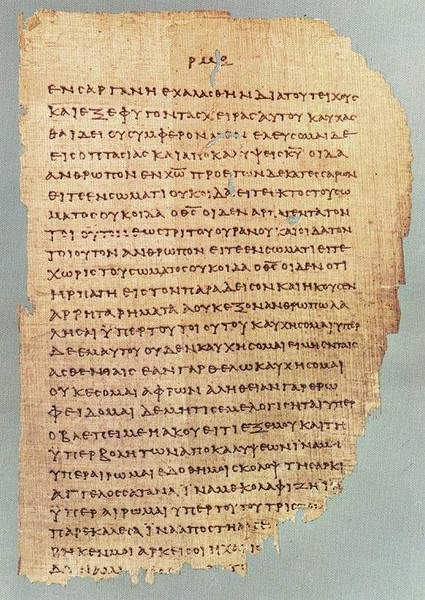
The Pastorals are letters in the New Testament (1 & 2 Timothy, Titus), written in the 80s or 90s CE by disciples of Paul writing in his name. These letters contain rules for electing bishops and deacons. The rules follow the cultural understanding of honor and shame; they should only elect good men who were valued in their communities for their moderate and exemplary behavior.
However, these letters also illustrate problems in the communities. Christians encouraged widows not to remarry, and many Gentile women quickly joined. They usually lived in the bishop's house, who was most likely elected for his large villa. 1 Timothy relates the scandal of their presence, as they sat around playing with their make-up and continually gossiping. Widows now could only join if they were 60 years of age (which would limit this population), and who had no children or family members to care for them. 1 Timothy also contains a passage where Paul allegedly said, "I forbid women to teach." Their salvation would only be achieved through the procreation of children - the traditional function of women.
Christian Adaptations to Society, Gender Roles & Sexuality
In the middle of the 2nd century CE, the leaders of Christianity came solely from Gentile backgrounds, although they maintained the Jewish Scriptures. They were upper class and educated in the schools of philosophy. Their teachings combined both the Jewish Scriptures as well the dominant culture in the Roman Empire. They were later deemed as 'Church Fathers' for their contributions to Christian dogma.
The Church Fathers knew that if you are going to try to sell the package of Christianity, you should not take on the dominant culture in a frontal assault. Rather, you absorb the dominant ideas and attempt to make yours compatible with existing traditions. For the most part, the Christian leaders held to traditional teachings on social classes and family. Social classes remained intact where the Jewish practice of charity was combined with the benefices of the aristocrats. However, Christians eliminated the idea of ethnic cults, by creating a portable religion. The customs of the ancestors (which included geography and language) were no longer identity factors. The earliest Christians also developed an initiation ritual, baptism, perhaps borrowed from the mystery cults. The importance of family was reinforced through the marriage ritual (making it sacred - a sacrament), and the couple was bound for life.
In the 4th and 5th centuries CE, Christians began pilgrimages to the tombs of earlier martyrs. This is where they borrowed the concept of “patron/client.” With the belief that these martyrs were in heaven, you could pray to them to intercede on your behalf. Thus, the patron saints of Catholic tradition.
In addition to its ban on idolatry, Christians preached innovative attitudes toward the body and sexual intercourse. Schools of philosophy taught the concept of asceticism (Greek for 'discipline') and philosophers taught the discipline of mind (soul) over matter (the physical body) where the passions (the physical urges of the body) should never rule the body. In relation to sexual urges, philosophers viewed this as an extreme moment of losing control.
With this background, the Church Fathers focused on the urges of the body, especially the sexual urge in relation to both private and public behavior. The Church Fathers adopted the concept of celibacy, or not entering into a marriage contract. This was understood as a sacrifice, as they rejected a normal life. It provided them with an aura of holiness, which placed them above the masses. The weaker members who could not sustain this sacrifice were to follow the traditions of marriage and children (which would help to grow the church).
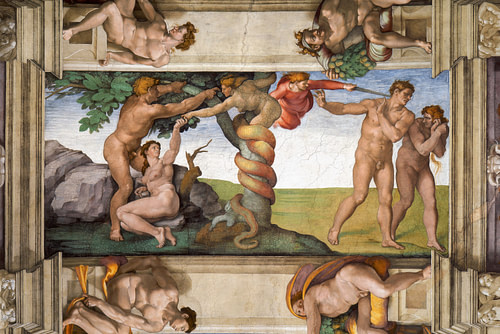
Sexual intercourse was now a sin, albeit a necessary evil. God himself created genitals "to be fruitful and multiply" (Genesis 1:28). But the Church Fathers claimed that the genitals were to be used solely for procreation. If you had sexual intercourse for any other reason, then you were guilty of the sin of lust. Adopting the current medical views regarding women, the Church Fathers dictated that sexual intercourse had to be with a woman on her back. Hence, the later term 'missionary position' taught by Christian missionaries to the natives they encountered during the colonial period. Any other position was lust. Barren women and women who had undergone menopause were to no longer have intercourse.
Using Paul's teaching on engaged couples and widows, Christian leaders developed their concept of virginity as cradle to grave. Young girls were handed over (as property) to the church to be raised as honored virgins. Widows were to remain widows; they now spent their lives and any inherited wealth in devotion to the church. The concept of virginity was built into the belief that salvation for women could be achieved by literally sacrificing their gender. Although prostitution was not a sin in the Jewish scripture, prostitutes were now condemned as sinners. This influenced later 19th-century CE legislation on prostitution as a crime against the state during a series of epidemics of syphilis in London and New York.
Through a process known as the personification of evil, the Church Fathers demonized all women as agents of the Devil. Eve, being weaker, was seduced by the serpent, now understood as the Devil, and she seduced Adam into sin. As descendants of Eve, all women were considered potential seducers of men. Thus, there could be no more women leaders in the churches. According to Tertullian, Eve and all women were the "Devil's gateway" and Eve was the "first deserter of the divine law", because of whom "even the Son of God had to die" (On the Apparel of Women, I). This was a heavy burden to bear. The view of what happened in the Garden of Eden influenced Augustine's concept of the Original Sin in the 5th century, and Augustine continued to promote the idea that the body and what we do with it, is the source of all evil.
